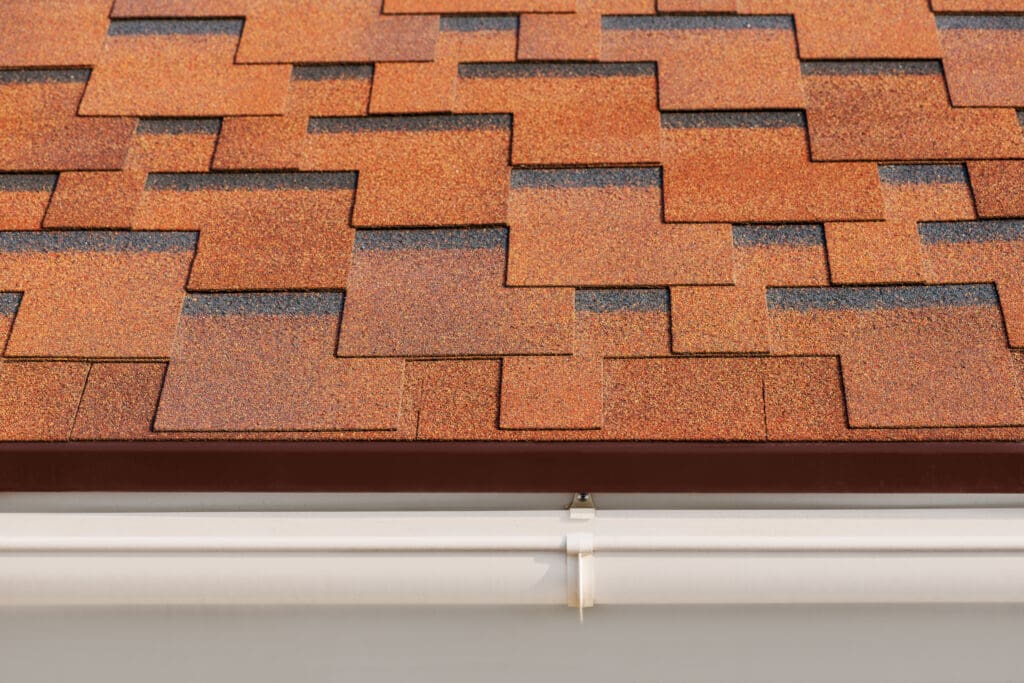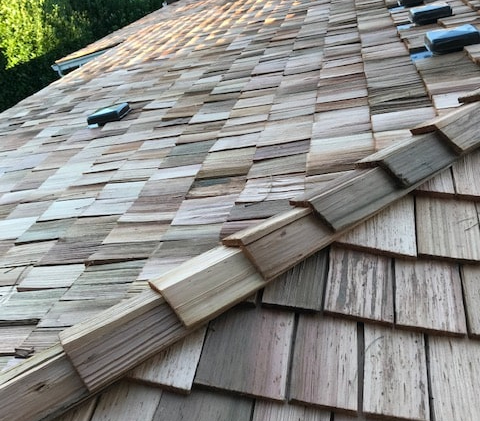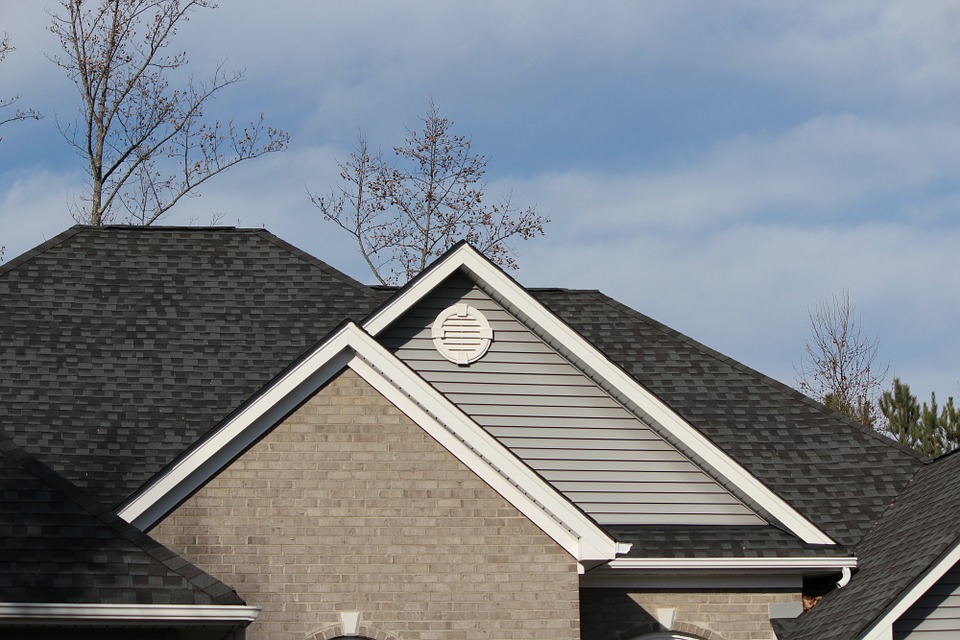
Published on February 14, 2025
When it comes to roofing, homeowners are often faced with a big decision: cedar shake roof or asphalt shingles? Both are popular roofing materials with their own unique advantages, but the right choice depends on your home’s needs, your budget, and your aesthetic preferences. If you’re unsure about which option is best for you, this cedar shake roof vs asphalt guide will break it all down in simple, easy-to-follow terms.
What Are Cedar Shake Roofs and Asphalt Shingles?
Before diving into the details, it’s important to understand the basics:
Cedar Shake Roofs
These are roofs made from real wood, usually cedar, which is known for being strong and durable. The wood is cut or split into pieces called “shakes” or “shingles.” Think of them like wooden tiles for your roof. They have a rough, textured look that gives your home a natural and rustic charm.
Many people love how cedar shakes look on cottages, Craftsman-style houses, or other traditional homes. Over time, the wood weathers and turns a soft silvery-gray color, which some homeowners find especially aesthetically pleasing. Because they’re made from natural wood, cedar shakes have a timeless appeal that’s hard to replicate.
Asphalt Shingles
These are the most popular type of roofing in the U.S., and there’s a good reason for it—they’re practical, affordable, and versatile. Asphalt shingles are made using a sturdy base (like fiberglass or organic material) that’s coated with asphalt to make them waterproof. On top of that, tiny granules are added to give them color, texture, and protection from the sun.
You’ve probably seen them in many homes since shingles are the most common choice for roofing. There are also dimensional shingles, which are thicker and have a layered look. These mimic more expensive materials like wood or slate, giving your roof extra depth and character without the higher price tag.
Key Differences Between Cedar Shake and Asphalt Shingles
 Now that you know what these materials are, let’s look at the differences that matter most to homeowners.
Now that you know what these materials are, let’s look at the differences that matter most to homeowners.
Durability
Cedar Shake Roofs: Cedar is naturally strong, and when properly cared for, a wood shake roof can last up to 30 years or more. However, cedar shakes require consistent upkeep. If you live in a wet or humid area, cedar can be prone to problems like rot, mold, or even pests, which can shorten its lifespan. On the flip side, in drier climates, cedar can hold up exceptionally well.
Asphalt Shingles: A high-quality asphalt shingle roof usually lasts 20 to 30 years, depending on the brand and how well it’s maintained. The great thing about asphalt shingles is that they’re naturally resistant to problems like rot and insects, which means you won’t have to worry about pests or water damage as much. Plus, many modern asphalt shingles come with special coatings that make them more durable and better able to handle extreme weather conditions like hail or heavy winds.
Energy Efficiency
Cedar Shake Roofs: Cedar is a natural insulator, which means it can help regulate your home’s temperature. During the summer, cedar shakes can keep your house cooler by blocking heat, and in the winter, they help trap warmth inside. This energy efficiency makes cedar a smart, eco-friendly choice, especially if you’re looking to save on heating and cooling costs.
Asphalt Shingles: Many asphalt shingles are designed to reflect sunlight, which helps keep your home cooler on hot days. These reflective coatings are particularly useful in sunny or warm climates, as they can lower your cooling bills. While asphalt shingles don’t have the same insulating properties as cedar, their modern technology has made them a good option for energy-efficient roofing.
Cost
Cedar Shake Roofs: Cedar shakes are beautiful, but they’re not cheap. Because they’re made from natural wood and require skilled labor for installation, they can cost between $8 and $15 per square foot. And while cost isn’t the only consideration, this makes them one of the pricier roofing options on the market.
Asphalt Shingles: Asphalt shingles are a much more budget-friendly option. Prices typically range from $3 to $6 per square foot, depending on the type of roofing and the quality of the shingles. If you’re looking for an affordable roof that still gets the job done, asphalt shingles are the clear winner here.
Appearance
Cedar Shake Roofs: If you’re looking for a roof that’s truly aesthetically pleasing, cedar shakes are hard to beat. They have a natural, rustic look that gives your home character and charm. Over time, cedar shakes develop a silvery-gray patina, which many homeowners find even more attractive. This timeless appearance works especially well on traditional or cottage-style homes.
Asphalt Shingles: While shingles are the most common roofing material, modern dimensional shingles have made asphalt roofs much more visually appealing. These shingles can mimic the look of more expensive materials, like wood or slate, at a fraction of the cost. With a variety of colors and styles to choose from, asphalt shingles can suit almost any home design.
Maintenance
Cedar Shake Roofs: Cedar requires more upkeep than asphalt shingles. To keep a cedar shake roof in good condition, you’ll need to clean it regularly, apply sealants, and watch for problems like moss or insect damage. Without proper maintenance, cedar shakes can deteriorate quickly, especially in damp or shaded areas.
Asphalt Shingles: Asphalt shingles are relatively low-maintenance. Periodic inspections and minor repairs are usually all that’s needed to keep them in great shape. If you want a roof that doesn’t require a lot of effort to maintain, asphalt shingles are the way to go.
Environmental Impact
Cedar Shake Roofs: Since cedar shakes are made from natural wood, they’re biodegradable and recyclable. However, there’s a downside: harvesting cedar trees can negatively impact forests if not done sustainably. Look for manufacturers that source their wood responsibly to minimize environmental concerns.
Asphalt Shingles: Asphalt shingles aren’t biodegradable, but they can often be recycled into materials like road asphalt. This helps reduce the amount of waste that ends up in landfills, making asphalt shingles a more eco-friendly option than you might expect.
Cedar Shake Roof vs. Asphalt: The Installation Process
How your roof is installed plays a major role in how long it will last, how well it performs, and how much maintenance it will need over time. Let’s take a closer look at the installation processes for both cedar shake roofs and asphalt shingles, so you know what to expect.
Cedar Shake Roof Installation
Installing a cedar shake roof is a more detailed and labor-intensive process. It requires skilled professionals who are experienced with working with natural wood materials. Here’s what’s involved:
Underlayment Installation
Similar to asphalt shingles, cedar shakes require a layer of underlayment beneath them. This layer, often made of felt or a synthetic material, provides an extra barrier against moisture and helps prevent leaks. Additionally, interlay felt strips are often placed between courses of cedar shakes to improve water shedding and prevent water from seeping through gaps.
Proper Spacing
Each cedar shake must be spaced just right to allow the wood to naturally expand and contract with changes in temperature and moisture. Incorrect spacing can lead to warping or cracking.
Specialized Fasteners
Cedar shakes need fasteners, like stainless steel nails, that won’t corrode or react with the wood. This prevents damage and extends the life of the roof.
Protective Treatments
To enhance durability, cedar shakes are often treated with sealants or coatings to protect them from moisture, UV rays, and pests. These treatments help the wood resist mold, mildew, and rotting, which are common in wetter climates.
While cedar shake roofs are beautiful and durable, their installation requires precision, care, and time, which is part of why they are more expensive than asphalt shingles.
 Asphalt Shingle Installation
Asphalt Shingle Installation
Asphalt shingles are much easier and quicker to install, making them a more cost-effective roofing option. The process is straightforward and includes the following steps:
Underlayment Installation
First, a layer of underlayment is laid over the roof deck. This acts as an extra barrier to protect against moisture and leaks.
Shingle Placement and Nailing
Each shingle is nailed down in an overlapping pattern, ensuring complete coverage. This overlap creates a watertight seal to prevent leaks and protect your home.
Alignment for Durability
Proper alignment is key to asphalt shingles’ longevity. Professional roofers ensure that each row is straight and evenly spaced to avoid gaps or weak spots.
Because the process is simpler and requires less time, asphalt shingles are a more practical choice for homeowners on a budget or those needing a quick roofing solution.
Cedar Shake Roof vs Asphalt: Pros and Cons of Each Option
Here’s a quick rundown of the pros and cons of cedar shake roofs and asphalt shingles to help you weigh your options:
Cedar Shake Roof
Pros:
- Beautiful, natural appearance
- Excellent insulation properties
- Durable when maintained properly
- Eco-friendly material
Cons:
- Expensive to install
- High maintenance
- Vulnerable to rot, mold, and pests in humid climates
Asphalt Shingles
Pros:
- Affordable and widely available
- Low maintenance
- Resistant to rot and insects
- Wide variety of styles and colors
- Many options come with robust roofing warranties
Cons:
- Shorter lifespan than cedar
- Less eco-friendly (though recyclable)
- Standard options may lack visual appeal compared to natural materials
Frequently Asked Questions
Which is better for long-term durability?
If properly maintained, a cedar shingle or shake roof can last longer than an asphalt shingle roof, but the difference depends on the climate and level of upkeep.
What is the most cost-effective option?
For most homeowners, asphalt shingles are the more affordable option, both in terms of initial installation and long-term maintenance.
Are cedar shakes environmentally friendly?
Yes, cedar is a natural wood product and biodegradable. However, its production involves cutting down trees, which can raise sustainability concerns.
Do cedar shakes and asphalt shingles offer good warranties?
Both options can come with roofing warranties, though asphalt shingles typically offer longer and more comprehensive coverage.
Which is more resistant to harsh weather?
Cedar shingles can withstand strong winds and heavy snowfall, but they’re vulnerable to moisture-related issues. Modern asphalt shingles are designed to handle severe weather conditions, including hail and high winds.
Can I install cedar shakes or asphalt shingles myself?
While some homeowners attempt DIY roofing projects, it’s strongly recommended to hire professionals for proper installation. Poor installation can lead to leaks, reduced durability, and voided warranties.
Cedar Shake Roof vs Asphalt? Warner Roofing & Construction is Here to Help
Still unsure about which type of roofing is right for you? At Warner Roofing & Construction, we understand that choosing between roofing options can be overwhelming. That’s why our team of skilled craftsmen is here to guide you every step of the way. With years of experience installing both cedar shakes and asphalt shingles, we’re confident in our ability to deliver a roof that will stand the test of time.
Contact us today for a consultation and let us help you find the perfect roofing solution for your home!